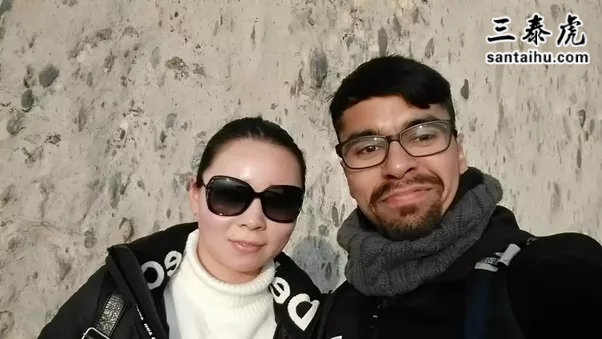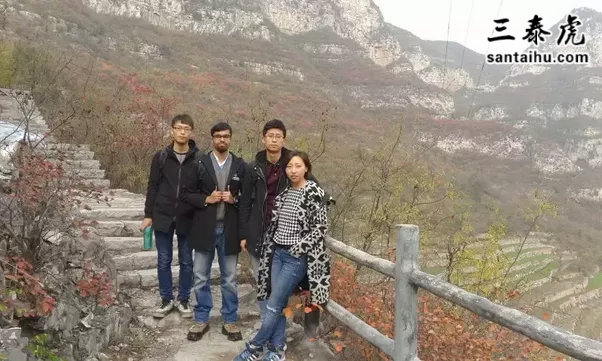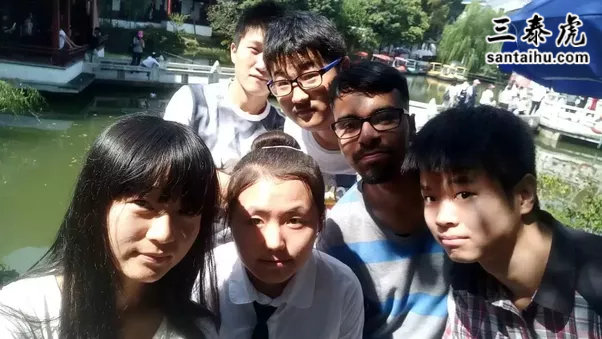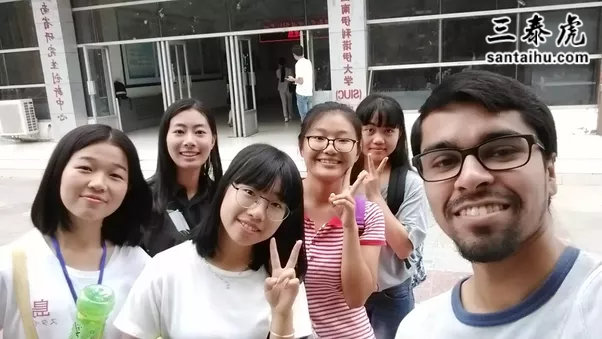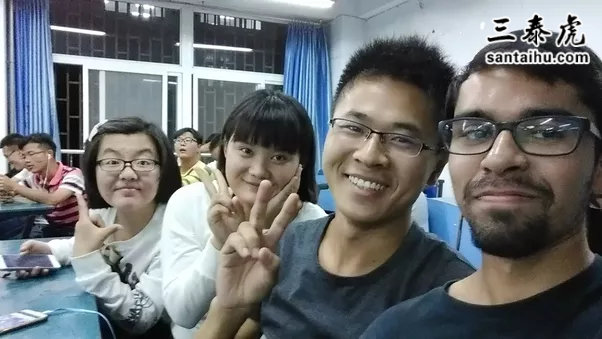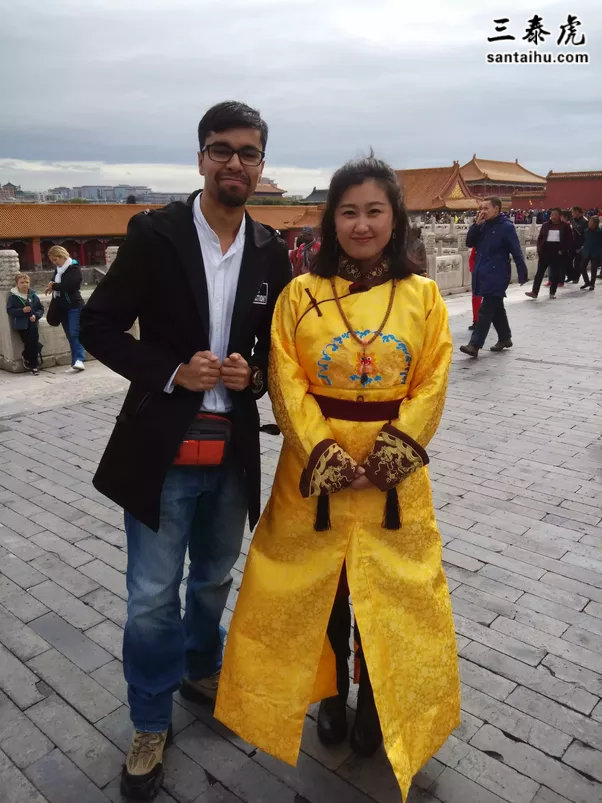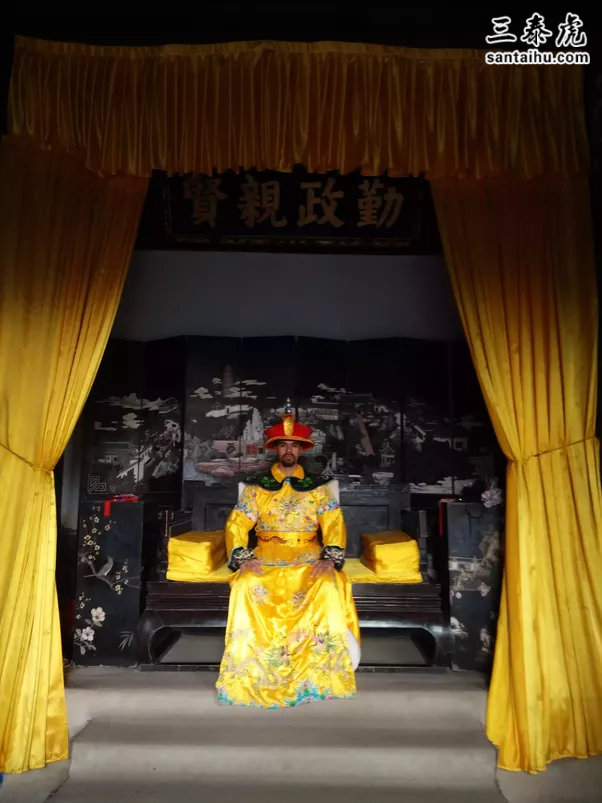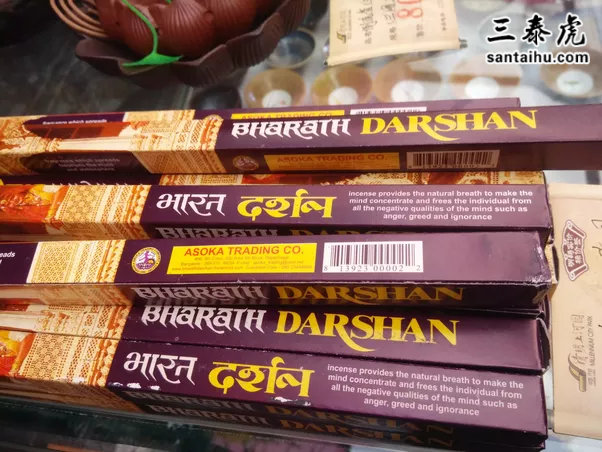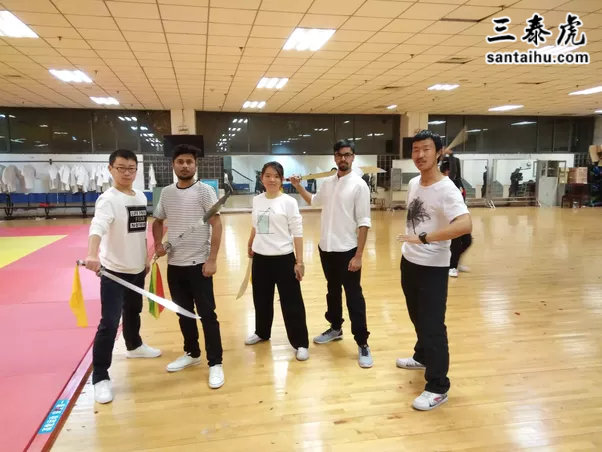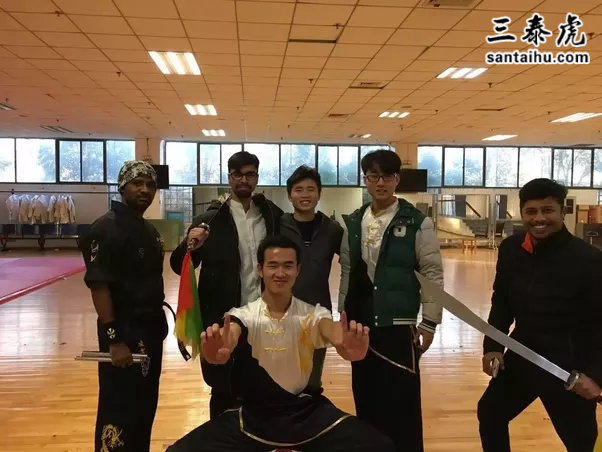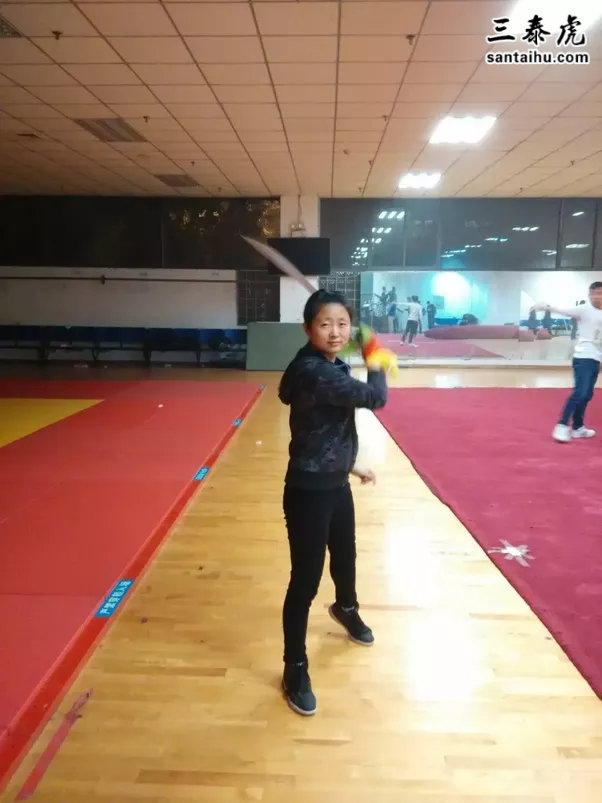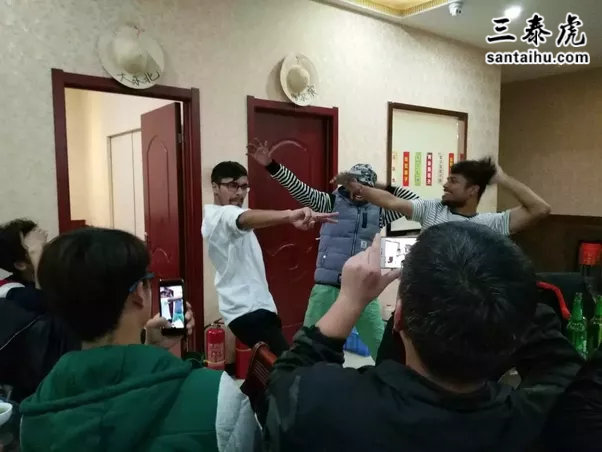印度人分享和中国人打交道时的感受
As an Indian what is your experience with China and its people?作为印度人,你跟中国和中国人打交道时有何体会?Quora读者的评论Prat
As an Indian what is your experience with China and its people?
作为印度人,你跟中国和中国人打交道时有何体会?
Quora读者的评论
Prateik Poddar, Indian doctor
Indifference. That was my experience on an average while travelling through some cities of China. I traveled to Beijing, Shanghai and Guangzhou a couple of years back. I even took the bullet train from Beijing to Shanghai, thus giving me a chance to mingle with the local populace. I also depended heavily on self made local transport arrangements to get around rather than rely on guides and tour operators, so as to experience the country much better. My experience was:
The average Chinese guy is not interested in a tourist. You would not see them either come forward to help you, nor would they make you feel victimized by racism. You would, for the most part, be ignored.
In the trains i traveled in, the Chinese kept to themselves, turning their faces away if we would be standing nearby. No effort was made on their part to either respond or join in any conversation. It could be because of a very limited penetration of English though, difficult to draw conclusions about that.
They depend heavily on a constant supply of hot water in all their public places including airports, train stations and trains. The hot water is used to instantly cook cup noodles and green tea which seems to be their staple diet on the go.
They are very difficult shopkeepers to deal with. Most of the shopkeepers were either rude or brash. They would not entertain too many questions about any product and were quick to refuse sale and ask you to leave. That was limited to the shops only though and cannot be generalized.
They travel a lot. Quite a lot. In large groups. And everyone carries a point and shootcamera around their neck, while wearing a cap, Bermudas and shoes with socks. It was like a uniform! And all these groups have a standard tour guide. It was funny finding such groups all over the tourist spots.
They love to have quirky hairstyles. It can get really weird at times. I have a picture in my camera somewhere of a young kid with his head shaved save for an actual apple logo formed by his hair….
I didn't get to interact much with the populace even while i was surrounded by the chinese, as they came across as very reserved, and i couldn't really grasp their pulse like i was able to in a lot of other countries i have visited.
It was a good trip on my part but it was really without incident.
That is my honest sense of the Chinese on my travels through the country
冷漠。这是我在中国一些城市旅行时基本都遇到过的。几年前我去过北京、上海和广州。我甚至还乘坐过从北京到上海的高铁,这为我提供了融入当地民众的机会。我也非常习惯自己安排在当地的交通出行,而不依赖导游和旅行社,这样可以更好的体验这个国家。我的体会是:
中国普通百姓对游客不感兴趣。他们不会来帮你,也不会让你觉得自己成为种族主义的受害者。在很大程度上,你会被他们忽视。
在我搭乘的火车里,中国人会把自己封闭起来,如果我们站的很近,他们会把脸转开。他们不会做出任何回应或参与任何谈话的尝试。这可能是因为英语的普及率非常有限,但很难就此得出结论。
在所有公共场所他们都亟需不间断的热水供应,包括机场、火车站和火车。他们用热水来泡杯面和绿茶,这似乎是他们出行时的日常主食。
他们是很难对付的店主。大多数店主要么粗鲁,要么傲慢。他们不会容忍客户对任何产品提出太多问题,很快就会拒绝出售,要求你离开。但这仅限于商店,不能一概而论。
他们出门旅游很普遍。非常普遍。一大群人乌泱泱的。每个人的脖子上挂着一部傻瓜相机,戴着帽子,穿着大短裤,袜子和鞋子。就像制服一样!所有这些旅行团都有一个导游标配。在各大旅游景点看到这样的旅行团,真是十分有趣。
他们喜欢古怪的发型。有时候真的很怪异。我的相机里有一张照片,是一个年轻的孩子剃光了头,头上就剩下一个苹果标志……
即使我被中国人包围着,我也没怎么和他们交流,因为他们给人的印象是非常内向的,我也无法像在我去过的许多其他国家那样真正了解他们。
对我来说,这是一次愉快的旅行,但真的没有什么意外。
这是我在中国旅行时对中国人的真实感受。
译文来源:三泰虎 http://www.santaihu.com/47094.html 译者:Joyceliu
Achint Agarwal
I don’t quite clearly understand what you mean by ‘China AND its people’ so I’ll just write about my experience with Chinese people while I was in China. Simply put, overwhelmingly positive. Before I start I’d like to inform everyone that China is a huge country with lots of people and differences in language and culture between north and south of the Yangtze river. So whatever views and opinions I express here are my personal observations and deductions. I lived and studied for 5 months at Zhengzhou University in Henan Province in central China.
After my stay, I can assure you all of one thing, Chinese people LOVE FOREIGNERS! They just love meeting foreigners. I can’t count the number of times random Chinese women would simply come up to me and ask me for a photograph. It always felt like I’m some movie star!
I’ll give you all an example. Once I was in a city called Tai’an in Shandong Province. I had come there for mountain climbing and touring. Over there I saw 2 Chinese women taking my photo while trying to hid their phones with their hands. I noticed this and struck a pose for them. What happened next was amazing. One of the women literally ran up to me, put her arm around mine and asked her friend to take our photo! Her friend then repeated the same. While I was taken aback I happily obliged.
我不太明白你说的“中国及中国人”是什么意思,所以我只写了我在中国期间与中国人打交道的经历。简单地说,充满正能量。在我开始之前,我想告诉大家,中国是一个幅员辽阔的国家,人口众多,长江以南以北的语言和文化上的差异很大。所以无论我在这里表达了什么观点,都是我个人的观察和推论。我在中国中部河南省的郑州大学生活学习了5个月。
我可以向你们保证一件事,中国人喜欢外国人! 他们喜欢见到外国人。我已经记不清有多少次了,不认识的中国女人走到我面前,向我索要照片。我总有自己像个电影明星的误觉!
我给大家举个例子。有一次我去山东省泰安市。我是去爬山、旅游的。在那里,我看到两个中国女人用藏在手里的手机给我拍照。我注意到了,就摆了个姿势。接下来发生的事令人吃惊。其中一个女人居然跑到我跟前,把胳膊搭在我的胳膊上,让她的朋友帮我们拍照!她的朋友也这么做了。我虽吃了一惊,但也高兴地答应了。
And yes, it was almost always women, my experience in China tells me that Chinese women are MUCH bolder than Chinese men; the men in china are actually quite shy. During my entire stay, hardly 2 or 3 men came up to me to ask for photos, that too mostly in groups. In another incident, I again went on a trekking trip organized by Zhengzhou University students. There was a bus that took us to our destination (which wasn’t very far from the university) and I happened to be the only foreigner on board. After exiting the bus, we stood in a queue for a final attendance check and while I was looking around most of the students around me were visibly felt excited/awkward with being next to foreigner and then this one guy up and says “Hey brother!”. Then we proceeded to have a chat. After that a girl invited me to join her and her friends for the trek.
Even my experience with old people was quite pleasant. While I can speak Chinese pretty well, I only know mandarin (普通话), and most elderly people in china speak their own local dialects. I was in Shanghai again on a tour. And yes, again it was again on a tour bus in which I was the only foreigner so I once again befriended and teamed up with a group of Chinese students from another university. SO this group of elderly men walk up to me and my friends and ask them where I’m from. I could understand this part and I replied in Chinese, to his utter surprise. Then our conversation went on as follows (my friend was translating for me as I could not understand the elder uncles’ dialect well)-
是的,几乎都是女性,我在中国的经历告诉我,中国女性比中国男性大胆得多;中国男人其实很害羞。我在中国逗留期间,来找我合照的男人最多也就2-3个,而且基本都是跟别人在一起的。还有一次,我参加了郑州大学学生组织的徒步旅行。有一辆公共汽车把我们送到目的地(离大学不远),我碰巧是车上唯一的外国人。下车后,我们排队等待最后的考勤,当我环顾四周时,我周围的大多数学生都因为身边就是外国人而明显带着兴奋/尴尬,然后有个人跟我说:“嘿,兄弟!”然后我们聊天了。在那之后,一个女孩邀请我和她以及她的朋友一起远足。
我和老人相处的经历也很愉快。我中文说的不错,但我只会说普通话,大多数中国老人只会说他们老家的方言。那是我去上海旅行时发生的事。是的,在一辆旅游巴士上,我是唯一的外国人,所以我又一次和一群来自另一所大学的中国学生成为了朋友。所以一群老人走到我和我的朋友面前,问他们我从哪里来。我能听懂这些,于是用中文回答他,让他大吃了一惊。然后我们接下来的谈话如下(我的朋友为我翻译,因为我听不太懂伯伯们的方言)
Old Uncle- Oh! You are Indian. Are you married?
Me- (laughing) No, no, not yet.
Old Uncle- How old are you?
Me- 21.
Old Uncle- Oh! So young! Do you have a girlfriend?
Me- (again laughing) No.
Old Uncle- What do you think of Chinese girls?
Me- (laughing uncontrollably)- More beautiful than Indian girls.
And everyone burst out laughing. (yes, Indian girls, I prefer Chinese girls, deal with it
My experience in meeting small kids (or rather, small kids staring at me) was even more hysterical. They’d shout to their mothers, “Mama, mama, look; FOREIGNER (外国人!)
I had numerous such experiences and made tons of friends to the point where now my Chinese friends outnumber my Indian friends! I travelled a lot in China and on each of these travels I’d have random passerbys smiling at me and saying “hello!” to which I’d reply “你好!” and watch as they were amazed!
This is how my conversation would go with strangers-
Chinese girl- Hello!
Me- 你好!(Nihao; hello in Chinese).
Chinese girl (wide-eyed)- 外国人会说中文!你好厉害!(foreigner can speak Chinese! You are awesome!)
Me- 哪里哪里!(polite and humble way of saying thank you)
老伯:哦!你是印度人。你结婚了吗?
我:(笑)不,不,还没有。
老伯:你多大了?
我:21了。
老伯:哦!这么年轻啊!有女朋友了吗?
我:(又笑了)还没有。
老伯:你觉得中国姑娘怎么样?
我:(情不自禁地笑了)——比印度女孩还漂亮。
大家都笑了起来:(是的,印度女孩,我更喜欢中国女孩,你们接受这个事实吧)
我还跟遇到过小孩子(或者更确切地说,盯着我看的小孩子),更激动兴奋。他们会对妈妈喊:“妈妈,妈妈,看;外国人(外国人!)
我有过很多次这样的经历,结交了很多朋友,现在我的中国朋友比印度朋友还多!我在中国旅行过很多次,每次都有路人对我微笑着说“Hello(你好)!”,而我会回答“你好!”,看着他们惊奇的样子。
这就是我和陌生人谈话的方式
中国女孩:Hello(你好)!
我:你好!
中国女孩(眼睛瞪得大大的):外国人会说中文!你好厉害!
我:哪里哪里!(表示感谢的礼貌、谦虚的说法)
So, all in all, I had a blast in China .
That being said I find an amusingly stark difference in the attitude of the people I met IN China and Chinese people on the internet, especially those on Quora. Here are my observations-
1)
I’ve seen a lot of people on Quora claim that their non-phonetic writing system is better than the phonetic system most other languages use. What I find amusing about this is that all; not most, ALL of the people I talked to in China were of the opinion that their language is the toughest to learn, even my Chinese language teachers, all of whom have been Chinese nationals, have said this. And this is solely because of the Chinese characters. While spoken Chinese is also tough but you can still somehow get used to the various sounds with practice. But characters? No one knows them all! There are more than 50,000 thousand of them of which 3000 are commonly used in day to day life! Compare that with Hindi. Learning 3000 symbols vs learning 54 symbols. Now I extend an olive branch here. I admit, English can get really confusing with all the silent letters in words, letters pronounced differently in each word, grammar exceptions, etc. So, English can be pretty tough for anyone, not only Chinese people. But, where Chinese people have added difficulty is the way their language is spoken compared to almost all other languages. Almost all languages are spoken mainly using the tongue and lips, various sounds are produced by moving the lips and tongue. But in Chinese, one rarely moves their tongue while speaking, Chinese is mainly spoken by applying varying degrees of pressure on the throat. This is why Chinese have a lot of problem in pronouncing even basic English words like “bus”. One of my Chinese friends asked me why ‘bus’ and ‘bath’ are spelt differently when they’re pronounced the same way? (he pronounced both the words like ‘bas’) -_- I had no reply to this.
总之,我在中国玩得很开心。
话虽如此,我发现我在中国遇到的人和在Quora上遇到的中国人在态度上有个有趣的明显区别。以下是我的观察
1)
我见过很多人在Quora上宣称他们的非语音书写体系比大多数其他语言的语音体系更优秀。我觉得有趣的是,我在中国聊过天的所有人都认为他们的语言是最难学的,甚至我的汉语老师,他们都是中国人,都这么说。这完全是因为汉字。虽然说汉语口语也很难,但你还是可以通过练习来适应各种发音。但是汉字呢?没有人完全搞懂过!汉字数量超过50000个,其中日常生活中常用的有3000个!和印度语比较一下。学习3000个字符对比学习54个符号。我承认,英语单词里的不发音字母、字母在每个单词中的不同发音、特殊语法等,也很让人困惑,因此,英语对任何人都是相当困难的,不仅仅是对中国人而言。但是,与几乎所有其他语言相比,中国人的语言表达方式增加了难度。几乎所有的语言都是以舌头和嘴唇为主,通过嘴唇和舌头的动作发出各种声音。但在汉语中,人们说话时很少动舌头,而是主要通过在喉咙上施加不同程度的压力。这就是为什么中国人在读“bus”这种基本的英语单词时有出现很多问题。我的一个中国朋友问我,为什么“bus”和“bath”的拼写会不一样?(他把两个词都念成“bas”)—我竟无言以对。
2)
Chinese people in general have no idea about the politics of their country, the history, politics and geography of other countries and have little interest in their own ancient history. I had asked quite a few Chinese people (students, teachers, village folk, slum dwellers, young people, old people, etc) about their knowledge of the border dispute between India and China. Most of them told me that they know there is some issue but have absolutely no idea about the who, what, where, why, when, how, etc.
2)
大多数中国人都不了解自己国家的政治,不了解其他国家的历史、政治和地理,对自己的古代历史也不感兴趣。我问过不少中国人(学生、教师、村民、贫民窟居民、青年、老人等)关于他们对中印边境争端的了解。他们中的大多数告诉我,他们知道存在一些问题,但对时间、地点、人物、事件、原因、方式等等完全不清楚。
3)
One thing I noticed in a book about Chinese history given to me by teacher. There was mention about the famous novel “Journey to the West” and the history book said that the monk Xuan Zang sought to “BRING BACK’ Buddhist scriptures from India to China. That is absolutely absurd because Buddhism originated in India so no, he didn’t bring back Buddhist scriptures to china, he copied them and brought them from India to China.
4)
Another I noticed is contrary to what the internet will tell you, Chinese area actually not atheists. Well, most Chinese people are atheist in the Christian sense but they are theist in the Indian sense.
5)
Almost all Chinese LOVE Western countries and many student want to go there to study or work and many parents want to send their children to USA or UK or Australia to study.
Again, these were mainly my observations with Chinese on the internet, the people I met in China were remarkably different. That being said, my favourite among the Chinese are people of Shandong province. While Chinese in general are quite sweet and kind, the people of Shandong province are even kinder and more welcoming among the Chinese.
3)
我在老师给我的一本关于中国历史的书中注意到一件事。书中提到了著名的小说《西游记》,历史书上说玄奘试图“把‘佛经’从印度带回中国”。这绝对是荒谬的,因为佛教起源于印度,所以他不是把佛经带回中国,而是把佛经的副本从印度带到中国。
4)
另一个我注意到的与互联网上所说相反的事是,中国人实际上并不是无神论者。嗯,大多数中国人在基督教徒眼中是无神论者,但在印度教徒眼中是有神论者。
5)
几乎所有的中国人都喜欢西方国家,许多学生想去那里学习或工作,许多父母想把他们的孩子送到美国、英国或澳大利亚学习。
同样,这些主要都是基于我在网上对中国人的观察,我在中国遇到的人是非常不同的。我最喜欢的中国人是山东人。虽然中国人基本上都很友好,但山东人在中国人里更热情好客。
random woman asking me for a photo (not the woman I mentioned earlier)
一个女路人提出跟我合影(不是我之前提到那位)
The Emperor of China! (我是秦代的秦奋!)
中国皇帝!
Bharat darshan agarbatti in china!
在中国也能买到老塔香!
I, an Indian guy was teaching my friend, a chinese girl, how to swing a chinese sword (刀)
我,一个印度男子,正在教我朋友——一位中国姑娘——如何舞刀弄剑
my friend here is drunk as hell
我朋友喝高了
We had a party with our chinese kung fu club friends. The entire restaurant, staff included was staring at us!
I’ll always cherish my stay in China as China made me dance again. Last time I danced before this pic was when I was 4 years old.
我们和我们的中国功夫俱乐部的朋友一起搞了个聚会。整个餐厅,包括餐厅员工都在盯着我们看!
我会永远珍惜我在中国的时光,因为中国又让我跳舞了。在这张照片之前,我最后一次跳舞是4岁时的事了。
Sivaraman Sundaram, lives in India
I had a lot of Chinese friends some of whom I keep in touch even today.
I studied at NTU in Singapore, went there to do my masters program. My course had a lot of people from PRC. It started off on the wrong foot, in our masters program there were two choices either you did a dissertation or a year long project chosen by Professors. There were 4 projects, as dissertation was a tougher option most of Indian and Chinese students took the project route. The attitude towards taking the easier option was strikingly similar between Chinese and Indian students.
Coming back to the wrong foot part. In one of the meetings with some Chinese, we were trying to form a team for a Software Security project, one particular guy mentioned that we, as in us Indians, should take this project as a lot of Indian govt websites can be easily hacked and needs better security and another girl openly laughed at it. I was sitting there like an idiot with no retort. But, we became cordial to each other through our course and had respect for one another.
However, beyond that one incident I have only positive memories of interacting and working with Chinese people.
Out of the 14 member Security project team I mentioned earlier four were put onto a smaller subsystem. Out of the four two were Chinese guys,another Indian girl and myself. We had a great time working on this team for over a year, we went to lunch together, shared stories about our cultures, families, growing up and wondering how similar we are. When it comes attitude towards family bonding , and stress on education and many more we are exactly the same.
我有很多中国朋友,时至今日我还和他们中的一些人保持联系。
我在新加坡南洋理工大学学习,在那里攻读硕士学位。我读的专业有很多中国人。一开始并不顺利,在我们的硕士项目中有两种选择,要么你撰写论文,要么由教授选择做为期一年的项目。项目共有4个,因为论文更难写,所以大多数印度和中国学生都选择做项目。中国学生和印度学生选择难度较低选项的态度惊人地相似。
说回不顺利的事。在和一些中国学生一起召开的某个会上,我们试图组建一个软件安全项目的团队,有个家伙提出,我们印度人,应该做这个项目,因为印度很多政府网站都很容易被黑,我们需要更高的安全性,另一个女孩毫不掩饰地笑了。我像个傻瓜一样坐在那里,没有反驳。但是,通过课程的学习,我们彼此亲切起来,互相尊重。
然而,除了那件事外,我对跟中国人的交流和合作全都是积极正面的记忆。
在我前面提到的14个成员的安全项目团队中,有4人负责一个较小的子系统。这四个人中有两个中国人,一个印度女孩,还有一个我自己。我们在这个团队里工作了一年多,我们一起吃午饭,分享我们的文化、家庭、成长的故事,对我们的相似而惊奇。当谈到对家庭关系的态度,以及对教育的重视,我们都是完全一样的。
Auro Sista I am an Indian citizen
Personal Experience:
My personal experience with a Chinese, from Mainland China, was with my roommate, for a semester, during my Masters at UIUC.
We were 3 people staying in a 3 bedroom apartment. I an Indian, a Mongolian guy, and a Chinese guy. My experience with them was very memorable. He was surprised when I was asking him questions about China and Chinese people and said that I knew a lot about China than he does about India. He was a very hardworking guy.
He’s a Civil Engineer and before coming for Masters he also worked on a construction project in Sri Lanka, where China was constructing a sea port. When we were talking about economy and politics, he had strong opinions on Asian superpower and used to tell me that China and India should work together as a counter to US. Haha.. all this when we were in USA.
He was very apolitical though, and did not think that the 1962 Indo-Cina war was even a war, but just a border skirmish. He said that while Chinese are very critical about Japan and USA they hardly talk about India
But as I said, he in general had a very positive opinion about India’s future. Regarding culture, Buddhism etc., he said that many Chinese know about ‘Journey to the West’ where West is India, one of their famous epics and think that India is a colorful land with magic. Unlike my Mongolian roommate my Chinese roommate was not religious. But he used to say how they believe in lucky charms. Actually both my roommates used to talk something about it, I generally have no clue what they talk about and just sit staring there.
个人经验:
我和一个来自中国大陆的中国舍友打过交道,那是我在美国伊利诺伊大学香槟分校读硕士的那个学期。
我们三个人住在一个有三个卧室的公寓里。分别是我这个印度人,一个蒙古人和一个中国人。我和他们相处的经历非常难忘。当我问他中国和中国人的问题时,他很惊讶,说我比他更了解中国。他是一个非常勤奋的人。
他是一名土木工程师,在攻读硕士学位之前,他还在斯里兰卡参与了一个建设项目,当时中国正在斯里兰卡建设一个海港。当我们谈论经济和政治的时候,他对亚洲超级大国有着强烈的看法,他曾经告诉我,中国和印度应该合作,对抗美国。哈哈. .在我们就身处美国境内的时候。
他非常不关心政治,也不认为1962年中印战争是一场战争,而仅仅是边境冲突。他说,虽然中国人对日本和美国非常批判,但他们很少谈论印度。
但正如我所说,他对印度的未来总体上持非常积极的看法。在文化、佛教等方面,他说,很多中国人都知道《西游记》里的西方就是印度,这是他们的历史著作之一,他们认为印度是一个充满神奇色彩的国度。跟我的蒙古室友不同的是,我的中国室友不信教。但他曾经说过他们有多么相信护身符。事实上,我的两个室友都曾经谈论过护身符,我不知道他们在谈论什么,只是坐在那里盯着他们看。
My Mongolian roommate was a Buddhist. It is funny, his last name is Khan. I did not meet him before the first day. Though his first name was alien to me, I assumed he would be a Muslim and South Asian. But hey I was wrong, he was from the land of Genghis Khan and very proud of it
My roommate also had no idea about Chinese border conflicts with India. He just said that, they learn something about it in school and media sometimes talks about it but nobody cares. Also, during the same time once, Modi visited Mongolia and announced some credits to Mongolia. My Mongolian roommate was shocked and said he thought India was full of slums and how did they afford so much money. Interestingly my Chinese roommate defended and said, even China has slums but it is still on the way to superpower.
In short it was fun. It was awkward sometimes. But it was worth to experience. We had funny food stories. I am a vegetarian and both my roommates were hardcore non vegetarian. My Mongolian roommate asked me if I was planning to become a monk.
我的蒙古室友是个佛教徒。有趣的是,他姓汗。第一天之前我没有见过他。虽然他的名字对我来说很陌生,但我认为他可能是和南亚人。但我错了,他来自成吉思汗的土地,并为此感到非常自豪。
我的室友也不知道中国与印度的边境冲突。他只是说,他们在学校学到了一些东西,媒体有时也会谈论到,但没人在意。在莫迪访问蒙古,并宣布了对蒙古提供贷款的时候。我的蒙古室友很震惊,说他认为印度到处都是贫民窟,他们怎么拿得出这么多钱。有趣的是,我的中国室友为我辩护说,就算是中国也有贫民窟,但中国依然走在通往超级大国的路上。
简而言之,这很有趣。有时很尴尬。但还是值得的经历。我们吃饭时也有过不少趣事。我是个素食主义者,我的两个室友都不是。我的蒙古室友还问过我是不是打算出家当和尚。
So that is my personal experience with China and Chinese people. I will strongly advice people to go through the answer below and especially our comment thread attached.
这就是我个人对中国和中国人民的印象。我强烈建议大家仔细阅读下面的答案,尤其是我们的评论帖
版权声明
我们致力于传递世界各地老百姓最真实、最直接、最详尽的对中国的看法
【版权与免责声明】如发现内容存在版权问题,烦请提供相关信息发邮件,
我们将及时沟通与处理。本站内容除非来源注明五毛网,否则均为网友转载,涉及言论、版权与本站无关。
本文仅代表作者观点,不代表本站立场。
本文来自网络,如有侵权及时联系本网站。
阅读:
-
1
चाइना में रेडी और ठेले Local shops in china || L...
- 2
- 3
- 4
- 5
- 6
- 7
- 8
- 9
- 10
-
1
चाइना में रेडी और ठेले Local shops in china || L...
- 2
- 3
- 4
- 5
- 6
- 7
- 8
- 9
- 10
